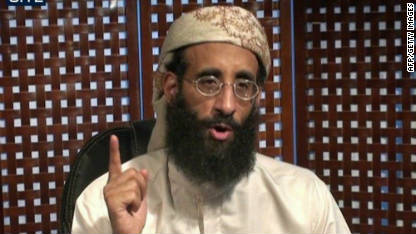
United States President Barack Obama has called the killing of Yemeni-American cleric Anwar al-Awlaki a "major blow to al-Qaeda's most active operational affiliate" but offered no apologies for the unprecedented manner in which he was killed.
"We will be determined, we will be deliberate, we will be relentless, we will be resolute in our commitment to destroy terrorist networks that aim to kill Americans," Obama told reporters in Washington.
But the controversial killing by armed drones on Friday steers the Obama administration into uncharted waters regarding the targeting and killing of US citizens deemed enemies of the state.
Al Jazeera's Rosiland Jordan, reporting from Washington, said the US justice department had refused to provide any legal justifications for the killings.
The US Department of Justice, according to Jordan, insisted "they had every right to go after a person they say engaged in treasonous behaviour and will not offer any apologies for going after al-Qaeda in any part of the world".
The White House refused to confirm reports that CIA drone aircraft and other military assets had mounted the raid, keeping a veil of secrecy over its anti-terror operations as it continued to raise pressing new ethical, diplomatic and legal headaches for US national security planners.
Analysts say the recent spate of killings reflected an evolving and aggressive strategy to snare terror suspects in areas once seen as havens but others were appalled at the stance now being adopted by Washington.
'Disturbing precedent'
Philip Ashton, a professor of law at New York University told Al Jazeera: "the precedent being set was deeply disturbing and was clearly not consistent with the requirements of international law and the whole notion that you have an intelligence agency [CIA] going out and carrying these killings is equally problematic".
John Brennan, Obama's top White House counter-terrorism adviser, pointed to new fronts in the war in a speech last month at Harvard.
| The life of Anwar al-Awlaki |
Still, Brennan conceded that "international legal principles, including respect for a state's sovereignty and the laws of war, impose important constraints on our ability to act unilaterally and on the way in which we can use force in foreign territories".
The 40-year-old al-Awlaki was killed in Yemen's al-Jawf province along with another US citizen, Samir Khan, the co-editor of al-Qaeda's Inspire magazine and Ibrahim al-Asiri, the organisation's top bomb-maker.
Khan, a US citizen of Pakistani origin, was a specialist in computer programming and was also wanted by both the US and Yemeni governments.
After three weeks of tracking the targets, armed drones and fighter jets shadowed al-Awlaki's convoy, before drones launched the lethal strike, US officials said.
Silenced voice
Al-Awlaki's death will be seen by many as the biggest success in the Obama administration's intensified campaign to take out al-Qaeda's leadership since the killing in May of Osama bin Laden in Pakistan.
The pursuit of al-Awlaki and Friday's strike were directed by the same US special unit that directed the raid on bin Laden's alleged hideout in Pakistan.
Amid the past seven months of political turmoil in Yemen, al-Qaeda and other armed groups have gained even more of a foothold, seizing control of at least three towns and cities in the south and battling with the army.
Experts claim Al-Awlaki gave al-Qaeda its international voice. He was young, fluent in English, well-acquainted with Western culture and with the discontent of young Muslims in the US.
His numerous video sermons, circulated on YouTube and other websites, offered a measured political argument, interspersed with religious lessons, that the US must be fought for waging wars against Muslims.
Downloads of his sermons were found in the laptops and computers of several groups arrested for plotting attacks in the US and Britain.
More deaths reported
A tribal chief in the area where al-Awlaki was killed told The Associated Press that the brother of one of those killed witnessed the strike.
The brother, who had sheltered the group in his nearby home, said the group had stopped for breakfast in the desert and were sitting on the ground eating when they saw the drone approaching.They rushed to their truck to drive off when the missiles hit, incinerating the vehicle, according to the tribal chief, who spoke on condition of anonymity because he did not want to be associated with the incident.
US officials said two other fighters were killed in the strike but the tribal chief, who helped bury the bodies in an al-Jawf cemetery, said seven people were killed, including al-Awlaki, Khan, two mid-level Yemeni al-Qaeda members, two Saudis and another Yemeni.
